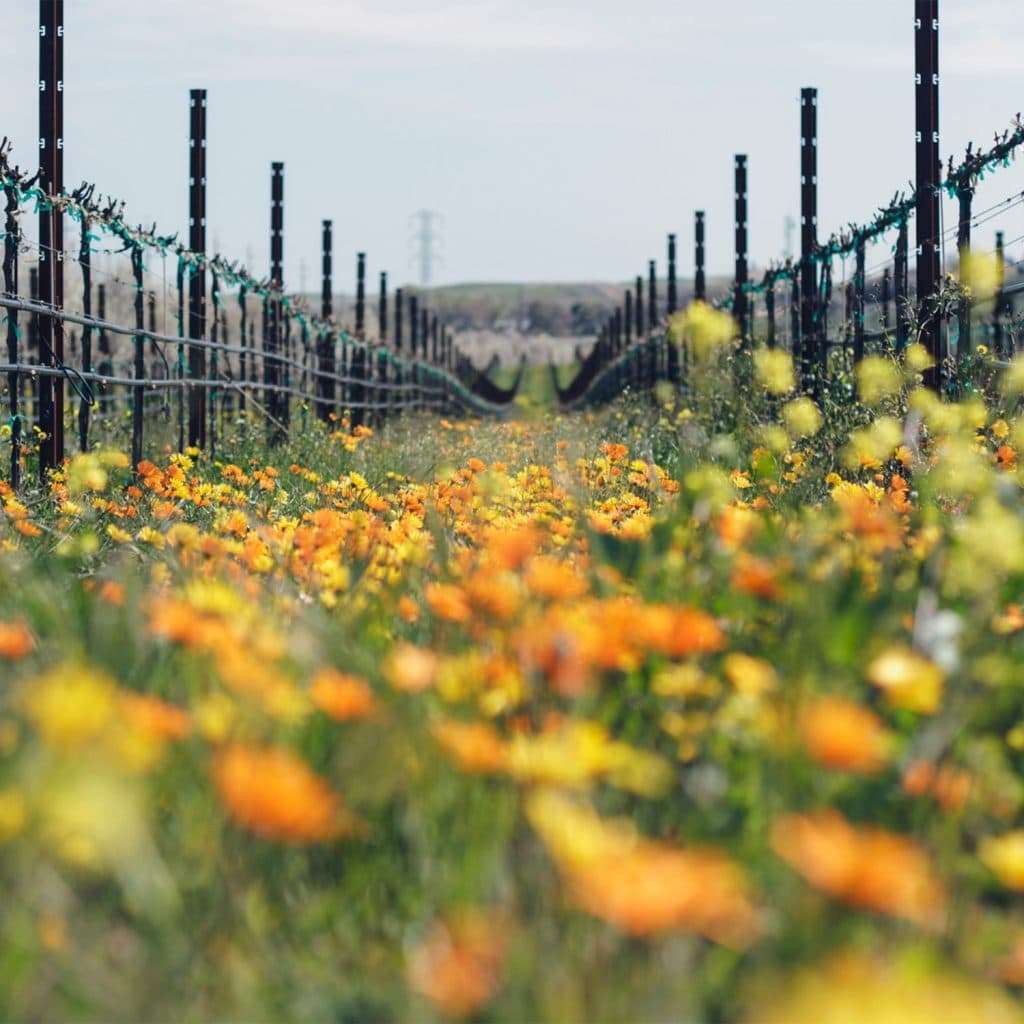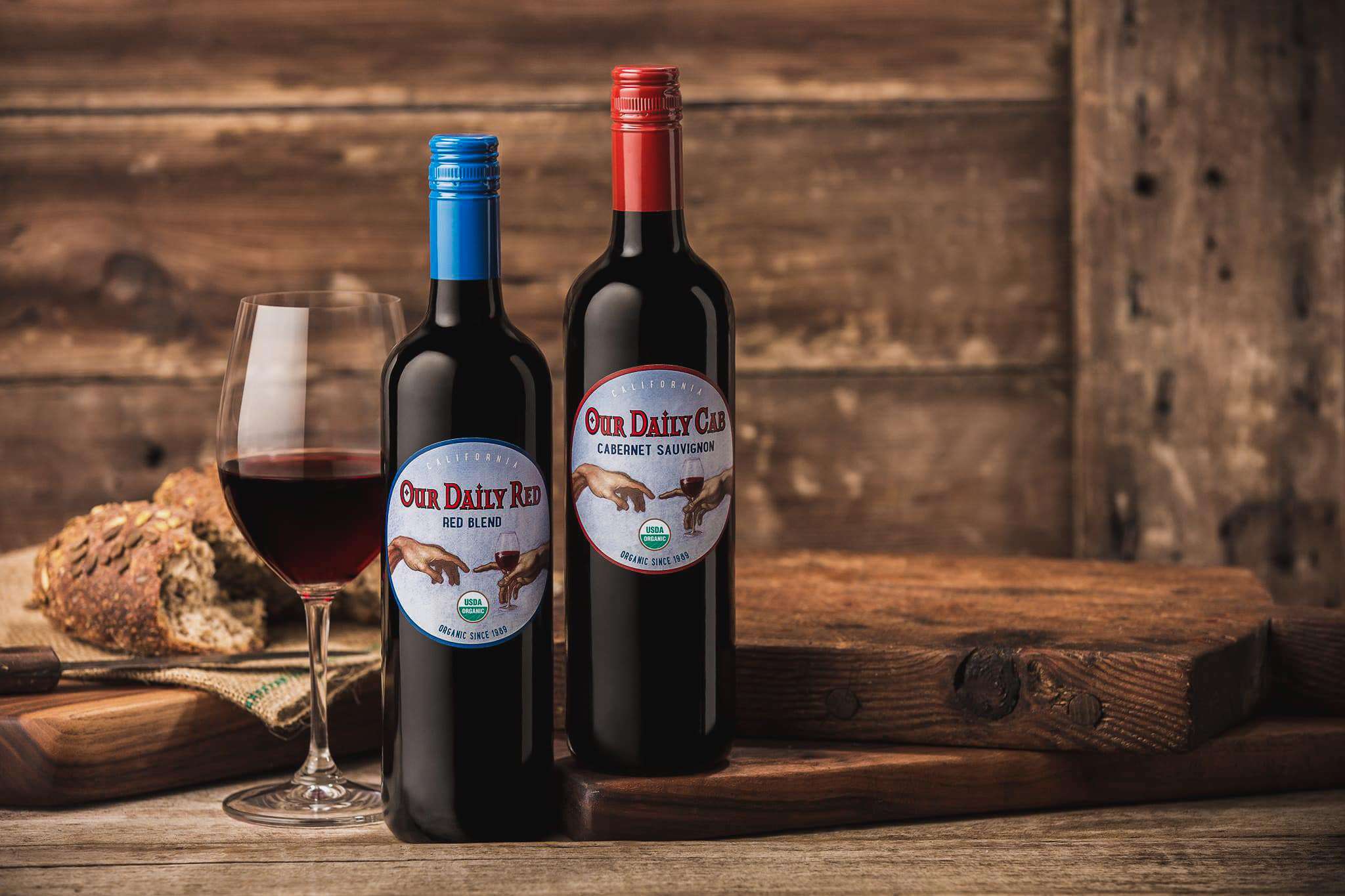
What’s in a wine? That all depends on how the grapes are grown. For organic and sustainable wine leader, Our Daily Wines, there’s a detectable difference in every sip.
There’s something to be said about early adopters—trailblazers take ideas from fringe concept to mainstream. That’s the case for Our Daily Wines, a leader in California’s sustainable and organic wine industry since the label launched in 1989, thirteen years before the USDA’s Certified Organic Program went into effect.
“Our Daily Wine’s journey began before organic products were as mainstream as they are now, with the goal of making USDA organic wine more accessible for those wanting to live an organic, preservative-free lifestyle,” Kurt Lorenzi, Our Daily Wine’s VP of Global Sourcing and Winemaking, told Ethos via email.
USDA-certified organic products, including wine, go through rigorous reporting and third-party testing processes to ensure only natural and certified organic materials are used in both the vineyard and cellar. “While conventional wines are allowed many chemicals and high sulfite levels in processing, USDA certified organic wines are produced using minimal interventions and preservatives,” says Lorenzi.
Organic wine benefits the environment
The benefits of organic are significant to the consumers, the growers, and the environment.
“USDA Certified Organic wines reduce pollution, conserve water, and promote biodiversity in the vineyards. Free of synthetic additives and preservatives like added sulfites, they are a pure and delicious expression of the land in which they are grown,” says Lorenzi.
Growing organically means the methods used can’t contaminate soil, water, or local communities with pollutants commonly found in agrochemicals like synthetic fertilizers, pesticides, and herbicides.
Our Daily Wines works with more than a dozen growers protecting more than 300 acres of California farmland.
Organic farming promotes soil health by encouraging cover crops that promote biodiversity. For vineyards, biodiversity also gets a boost by using an influx of predatory insects including ladybugs and honeybees that can feed on aphids and mites that would otherwise damage grape vines. By working with insects, this means pesticides aren’t needed.

Organic agriculture has boomed in the decades since Our Daily Wines first started out growing its grapes organically. According to recent USDA data, the number of organic farms in the U.S. has gone from 11,000 in 2008, to more than 16,500 in 2019. Sales of organic food have increased 31 percent just between 2016 and 2019, with sales near $10 billion—an industry first.
Despite the growth in sales, organic wine is still niche, making up just one percent of all wine by volume (and 2 percent by value), according to data from Nielsen.
According to Drizly, the leading online wine seller, organic wine sales grew 400 percent year-on-year, eclipsing the platform’s conventional wine sales growth by 50 points.
“Though the natural wine category remains small relative to the overall wine sales,” notes Liz Paquette, Drizly’s head of consumer insights, “growing consumer interest in health-conscious drinks — seen in the rise of categories like hard kombucha and nonalcoholic drinks across all categories — makes it one to watch in the coming years.”
The shift is happening industry-wide. In Bordeaux, France, the world’s biggest wine-producing region, 100 percent of wine producers are expected to be certified organic, sustainable, or in transition by 2025.
“As consumers express more interest in what is in the wine they are drinking and how it is produced, brands will put more emphasis on creating clarity in their marketing,” Paquette says. “We predict consumers will increasingly reach for natural brands and bottles as they seek more transparency and ‘better-for-you’ wines that are also better for the environment.”
A taste of organic wine
With all of the benefits organic wine delivers, skeptics still question how it impacts flavor.
“Some may think that organic wines don’t taste as good as conventional,” says Lorenzi. But recent research shows the opposite is true. Research published last year found that organic or biodynamic wines did indeed taste better in an analysis of two studies on more than 200,000 wines. The research looked at scores from wine critics in France and California—two of the most respected wine-growing regions.
“Organic and biodynamic wines showed much higher quality,” study co-author Magali Delmas, an environmental economist at UCLA Anderson School of Management, said in a statement. “It’s another example of sustainable goods providing additional benefits to consumers.”

A 2016 study by Delmas and Gergaud found similar results for California wines. Organic California wines scored 4.1 percent higher than unlabeled wines when surveyed for taste.
Despite the increasing popularity of sustainability across most industries—and consumers showing a willingness to pay more for it—wine hasn’t enjoyed the same boom. Part of that is due to the shorter window for consumption or organic wines. Because they contain no preservatives, they’re best consumed within 1-2 days of opening.
But for Our Daily Wines, the flavor is built-in.
“Healthy grapes have thicker skins, which adds tons of great flavor,” says Lorenzi. “At Our Daily, we start by selecting the best quality fruit for our wines. This is important to flavor, because we don’t use winemaking techniques or add anything that masks the natural flavor of the grape. This allows it to be the star of the show, which makes for a delicious wine.”
There’s also terroir, something Our Daily Wines says is even more noticeable in its organic wines because of its commitments to the land. “With no additives or preservatives, the natural character of the grape shines through in the wine,” says Lorenzi.
Our Daily Wines is also free from added sulfites. While sulfites occur naturally in wine, adding sulfites can extend flavor. But it comes at a cost—mainly headaches. But some people can have stronger reactions. Our Daily Wines is one of the only brands on the market that contains no detectable sulfites. The brand achieves that with novel technology that ensures freshness without the need for added sulfites.
Another reason sustainably-minded consumers may want to opt for Our Daily Wines: they’re all vegan. What makes a wine not vegan might come as a shock. Winemakers have been using animal-derived ingredients for ages in the fining process. Some of the more common fining agents include egg whites, gelatin, casein, and isinglass (fish bladders). Not only are these processes a bit cringe-worthy on premise, they’re not exactly sustainable, even if they’re classified as byproducts of the meat, egg, or dairy industries.
For Our Daily Wines, the sentiment shared by California naturalist John Muir that’s a driving force behind every glass. “When we try to pick out anything by itself, we find it hitched to everything else in the Universe.”
Our Daily Wines

Cabernet Sauvignon
The dark fruit notes of plum and blackberry in Our Daily Wines’ Cabernet Sauvignon are complemented by a hint of toasty vanilla. Smooth and rich in character with an intense finish.

Our Daily Red Blend
This blend of Syrah, Grenache, Ruby Cabernet, Carignan delivers ripe notes of fresh raspberry and juicy cherry accented by a subtle aroma of violets. Light-bodied and vibrant with an elegant finish.


